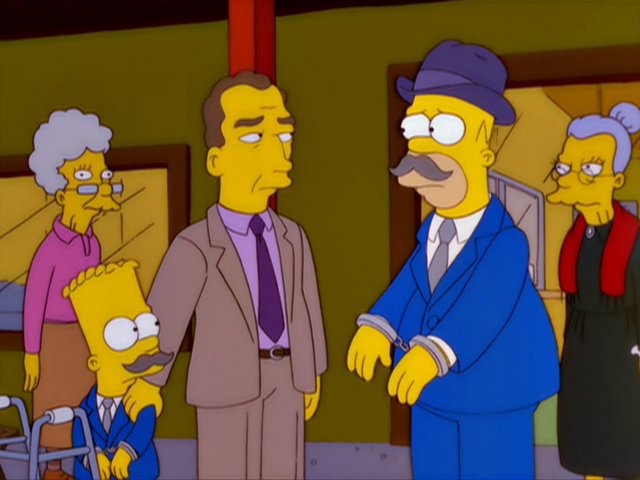
Dipper: “Mabel, you know all those boy bands are fake, right?”
Wendy: “Dipper’s right. They’re just a manufactured product of the bloated corporate music industry.”
Mabel: “You’re making my dance sad.”
– “Boyz Crazy”, Gravity Falls
Airdate: February 25th, 2001
Written By: Tim Long
Plot: Bart’s recent scheme to screw around with a local marathon result almost has him killed. Fortunately, he’s saved by an opportunistic music manager, L.T. Smash, who manages to lure him into being a member of a new boy band project, the Party Posse. The band, thanks in part to autotune, becomes wildly successful. However, their lyrics slowly start to betray a more insidious motive behind the band’s formation.
Review:
May 20th, 2012. An unsuspecting date in the history of the wider world. Thousands of Chelsea Football Club fans pack central London to watch the Blues celebrate their Champions League victory via an open-top bus parade. Robin Gibb succumbs to cancer at the age of 62, leaving Barry Gibb as the sole remaining brother of the four Brothers Gibb that dominated pop music in the late 70s. It was a Sunday, but the Dow Jones Industrial Average would end the previous Friday at 12369.28 points. Gotye and Kimbra were on top of the charts with the vicious breakup song “Somebody That I Used to Know”
And it was the day that took my dedication to The Simpsons and slammed the nail into the coffin. I’ve mentioned before my disdain for “Lisa Goes Gaga”, but it stands repeating that it was more for sentimental reasons. It was the episode that soured me on the show’s current state forever, that made me realize that the series wasn’t just in a declined state, but downright decrepit. The sheer sycophancy to its topic of the day, the shameless attempts at a ratings grab, the plot rife with cliches for both show and medium, the shocking comedy… it wouldn’t have passed as a script for a third-rate 80s sitcom. “Lisa Goes Gaga” was the antithesis, a show almost proud of the concept of self-betrayal.
The Simpsons had sold out to follow current trends before, but this was when I could no longer rationalize it. I did watch a few “new” episodes over the next two years before giving up proceedings, but this was effectively the end. So disillusioned was I that, for a brief while, I threw the spot of “personal favorite TV show” to Gravity Falls and Red Dwarf once I really got into those particular shows.
I mention this because this was not the first time The Simpsons used the realm of contemporary music in what seemed like a grab at relevance. No, they were doing so as far back as Season 12’s “New Kids on the Bleech”.
And no, this episode isn’t exactly topping the charts, either. But it’s not quite as big of a bust as I remembered it to be.








You must be logged in to post a comment.